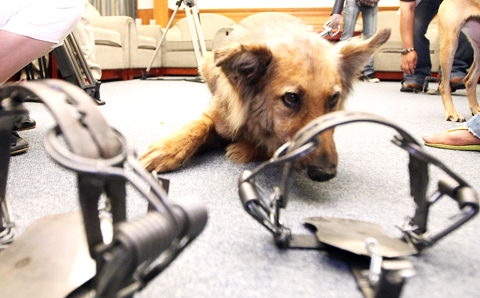Each year many animals in the country are killed or injured by dangerous gin traps that can be easily bought at hardware stores, a legislator and animal rights groups said yesterday as they called on the government to ban the traps.
“Gin traps are the No. 1 killer of animals in Taiwan,” Chinese Nationalist Party (KMT) Legislator Ting Shou-chung (丁守中) said at a news conference held with representatives from several animal rights and protection groups.
They said vegetable farmers or livestock breeders use gin traps — a metal clip with sharp teeth — to prevent stray animals, mostly dogs and cats, from eating their harvests or flocks.

PHOTO: CNA
However, the devices can harm the animals badly or cause them to bleed to death after being left in the trap, said Lin Ya-che (林雅哲), a veterinarian who also serves as a volunteer for the Life Conservationist Association.
Although the use of the devices is banned, people can easily purchase them at hardware stores because the law does not ban their manufacture and sale, Ting said, citing a local academic who estimated that there are around 3 million of the traps around the country.
The traps, which cost between NT$35 and NT$50 each, can be found in national parks, putting endangered animals and people who stray from hiking trails at risk, he said.
Lin said that the National Police Agency should consider gin traps as weapons to restrict them from being manufactured or traded in the country.
“Gin traps are like landmines that can harm anyone who steps on them unexpectedly,” Lin said.
In response, Forestry Bureau Deputy Director General Lee Tao-sheng (李桃生) said that under the existing law, people who trap unprotected animals with gin traps face a fine of between NT$60,000 and NT$300,000. If they harm a protected animal such as a Formosan black bear, they will be punished with between six months and five years imprisonment, along with a fine of between NT$200,000 and NT$1 million (US$30,600), Lee said.
He said that more effort would be made to crack down on the use of the traps in forests, including reinforcing patrols in the woods, but he said that it is difficult to catch the people who set the traps.

Costa Rica sent a group of intelligence officials to Taiwan for a short-term training program, the first time the Central American country has done so since the countries ended official diplomatic relations in 2007, a Costa Rican media outlet reported last week. Five officials from the Costa Rican Directorate of Intelligence and Security last month spent 23 days in Taipei undergoing a series of training sessions focused on national security, La Nacion reported on Friday, quoting unnamed sources. The Costa Rican government has not confirmed the report. The Chinese embassy in Costa Rica protested the news, saying in a statement issued the same

Temperatures in New Taipei City’s Sindian District (新店) climbed past 37°C yesterday, as the Central Weather Administration (CWA) issued heat alerts for 16 municipalities, warning the public of intense heat expected across Taiwan. The hottest location in Taiwan was in Sindian, where the mercury reached 37.5°C at about 2pm, according to CWA data. Taipei’s Shilin District (士林) recorded a temperature of 37.4°C at noon, Taitung County’s Jinfeng Township (金峰) at 12:50 pm logged a temperature of 37.4°C and Miaoli County’s Toufen Township (頭份) reached 36.7°C at 11:40am, the CWA said. The weather agency yesterday issued a yellow level information notice for Taipei, New

Taiwan’s Liu Ming-i, right, who also goes by the name Ray Liu, poses with a Chinese Taipei flag after winning the gold medal in the men’s physique 170cm competition at the International Fitness and Bodybuilding Federation Asian Championship in Ajman, United Arab Emirates, yesterday.

A year-long renovation of Taipei’s Bangka Park (艋舺公園) began yesterday, as city workers fenced off the site and cleared out belongings left by homeless residents who had been living there. Despite protests from displaced residents, a city official defended the government’s relocation efforts, saying transitional housing has been offered. The renovation of the park in Taipei’s Wanhua District (萬華), near Longshan Temple (龍山寺), began at 9am yesterday, as about 20 homeless people packed their belongings and left after being asked to move by city personnel. Among them was a 90-year-old woman surnamed Wang (王), who last week said that she had no plans